Icon College: Understanding and Leading Change Report, HND Business
VerifiedAdded on 2022/12/09
|18
|5637
|240
Report
AI Summary
This report provides a comprehensive analysis of understanding and leading change within organizations, using Unilever as a case study. It examines the impact of organizational change on company strategy and operations, including the implementation of new technology, mergers and acquisitions, changes in organizational culture, and shifts in leadership styles. The report delves into both internal and external drivers of change, such as political, economic, social, technological, legal, and environmental factors (PESTLE analysis), as well as internal strengths, weaknesses, opportunities, and threats (SWOT analysis). Furthermore, it explores measures to minimize the impact of change on organizational behavior, including the application of Kotter's change management model, and discusses different barriers to change and their influence on decision-making. Finally, the report outlines various leadership approaches that can be employed to effectively manage change within an organization, providing a holistic view of the challenges and opportunities associated with leading change.
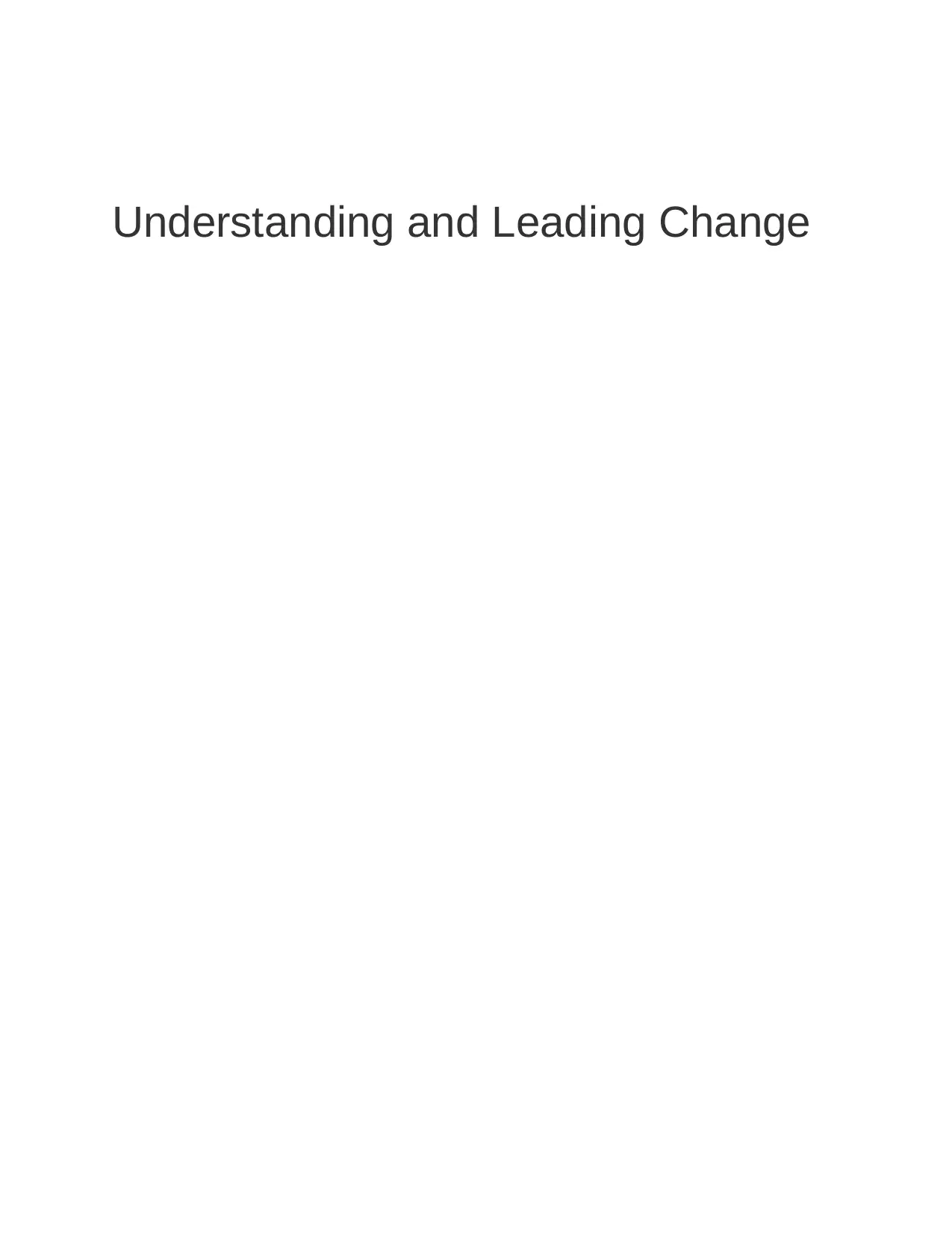
Understanding and Leading Change
Paraphrase This Document
Need a fresh take? Get an instant paraphrase of this document with our AI Paraphraser
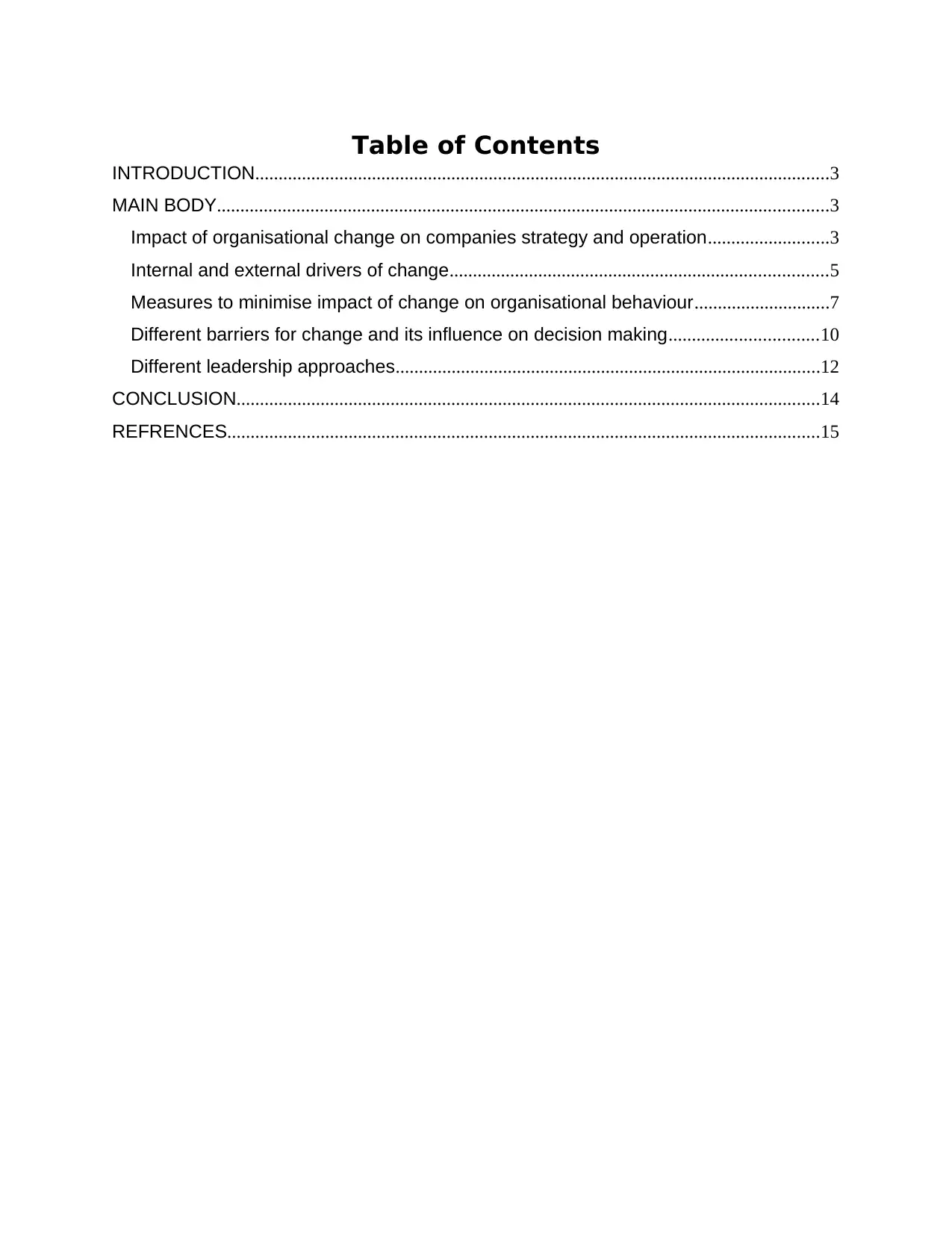
Table of Contents
INTRODUCTION...........................................................................................................................3
MAIN BODY...................................................................................................................................3
Impact of organisational change on companies strategy and operation..........................3
Internal and external drivers of change.................................................................................5
Measures to minimise impact of change on organisational behaviour.............................7
Different barriers for change and its influence on decision making................................10
Different leadership approaches...........................................................................................12
CONCLUSION.............................................................................................................................14
REFRENCES...............................................................................................................................15
INTRODUCTION...........................................................................................................................3
MAIN BODY...................................................................................................................................3
Impact of organisational change on companies strategy and operation..........................3
Internal and external drivers of change.................................................................................5
Measures to minimise impact of change on organisational behaviour.............................7
Different barriers for change and its influence on decision making................................10
Different leadership approaches...........................................................................................12
CONCLUSION.............................................................................................................................14
REFRENCES...............................................................................................................................15
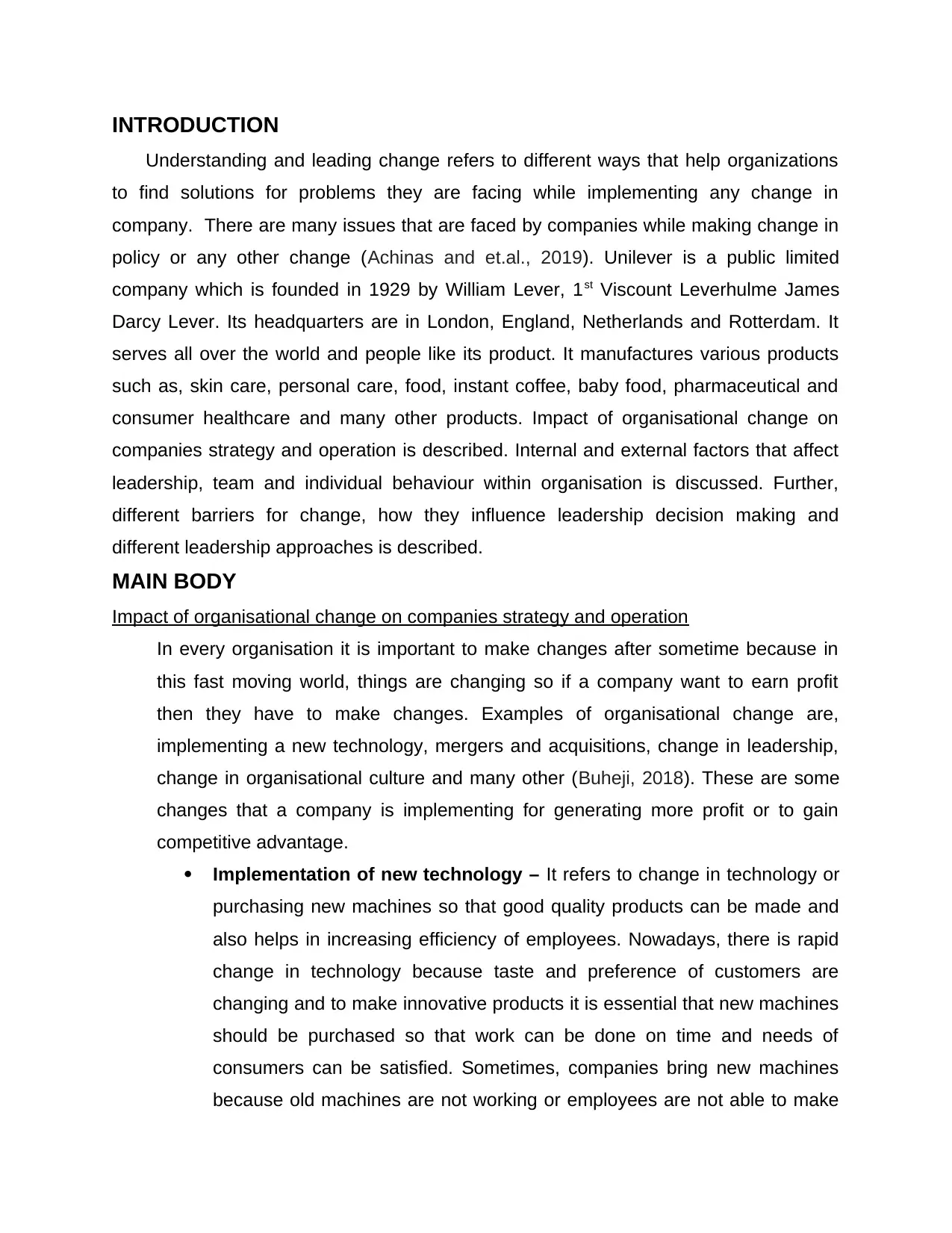
INTRODUCTION
Understanding and leading change refers to different ways that help organizations
to find solutions for problems they are facing while implementing any change in
company. There are many issues that are faced by companies while making change in
policy or any other change (Achinas and et.al., 2019). Unilever is a public limited
company which is founded in 1929 by William Lever, 1st Viscount Leverhulme James
Darcy Lever. Its headquarters are in London, England, Netherlands and Rotterdam. It
serves all over the world and people like its product. It manufactures various products
such as, skin care, personal care, food, instant coffee, baby food, pharmaceutical and
consumer healthcare and many other products. Impact of organisational change on
companies strategy and operation is described. Internal and external factors that affect
leadership, team and individual behaviour within organisation is discussed. Further,
different barriers for change, how they influence leadership decision making and
different leadership approaches is described.
MAIN BODY
Impact of organisational change on companies strategy and operation
In every organisation it is important to make changes after sometime because in
this fast moving world, things are changing so if a company want to earn profit
then they have to make changes. Examples of organisational change are,
implementing a new technology, mergers and acquisitions, change in leadership,
change in organisational culture and many other (Buheji, 2018). These are some
changes that a company is implementing for generating more profit or to gain
competitive advantage.
Implementation of new technology – It refers to change in technology or
purchasing new machines so that good quality products can be made and
also helps in increasing efficiency of employees. Nowadays, there is rapid
change in technology because taste and preference of customers are
changing and to make innovative products it is essential that new machines
should be purchased so that work can be done on time and needs of
consumers can be satisfied. Sometimes, companies bring new machines
because old machines are not working or employees are not able to make
Understanding and leading change refers to different ways that help organizations
to find solutions for problems they are facing while implementing any change in
company. There are many issues that are faced by companies while making change in
policy or any other change (Achinas and et.al., 2019). Unilever is a public limited
company which is founded in 1929 by William Lever, 1st Viscount Leverhulme James
Darcy Lever. Its headquarters are in London, England, Netherlands and Rotterdam. It
serves all over the world and people like its product. It manufactures various products
such as, skin care, personal care, food, instant coffee, baby food, pharmaceutical and
consumer healthcare and many other products. Impact of organisational change on
companies strategy and operation is described. Internal and external factors that affect
leadership, team and individual behaviour within organisation is discussed. Further,
different barriers for change, how they influence leadership decision making and
different leadership approaches is described.
MAIN BODY
Impact of organisational change on companies strategy and operation
In every organisation it is important to make changes after sometime because in
this fast moving world, things are changing so if a company want to earn profit
then they have to make changes. Examples of organisational change are,
implementing a new technology, mergers and acquisitions, change in leadership,
change in organisational culture and many other (Buheji, 2018). These are some
changes that a company is implementing for generating more profit or to gain
competitive advantage.
Implementation of new technology – It refers to change in technology or
purchasing new machines so that good quality products can be made and
also helps in increasing efficiency of employees. Nowadays, there is rapid
change in technology because taste and preference of customers are
changing and to make innovative products it is essential that new machines
should be purchased so that work can be done on time and needs of
consumers can be satisfied. Sometimes, companies bring new machines
because old machines are not working or employees are not able to make
⊘ This is a preview!⊘
Do you want full access?
Subscribe today to unlock all pages.

Trusted by 1+ million students worldwide
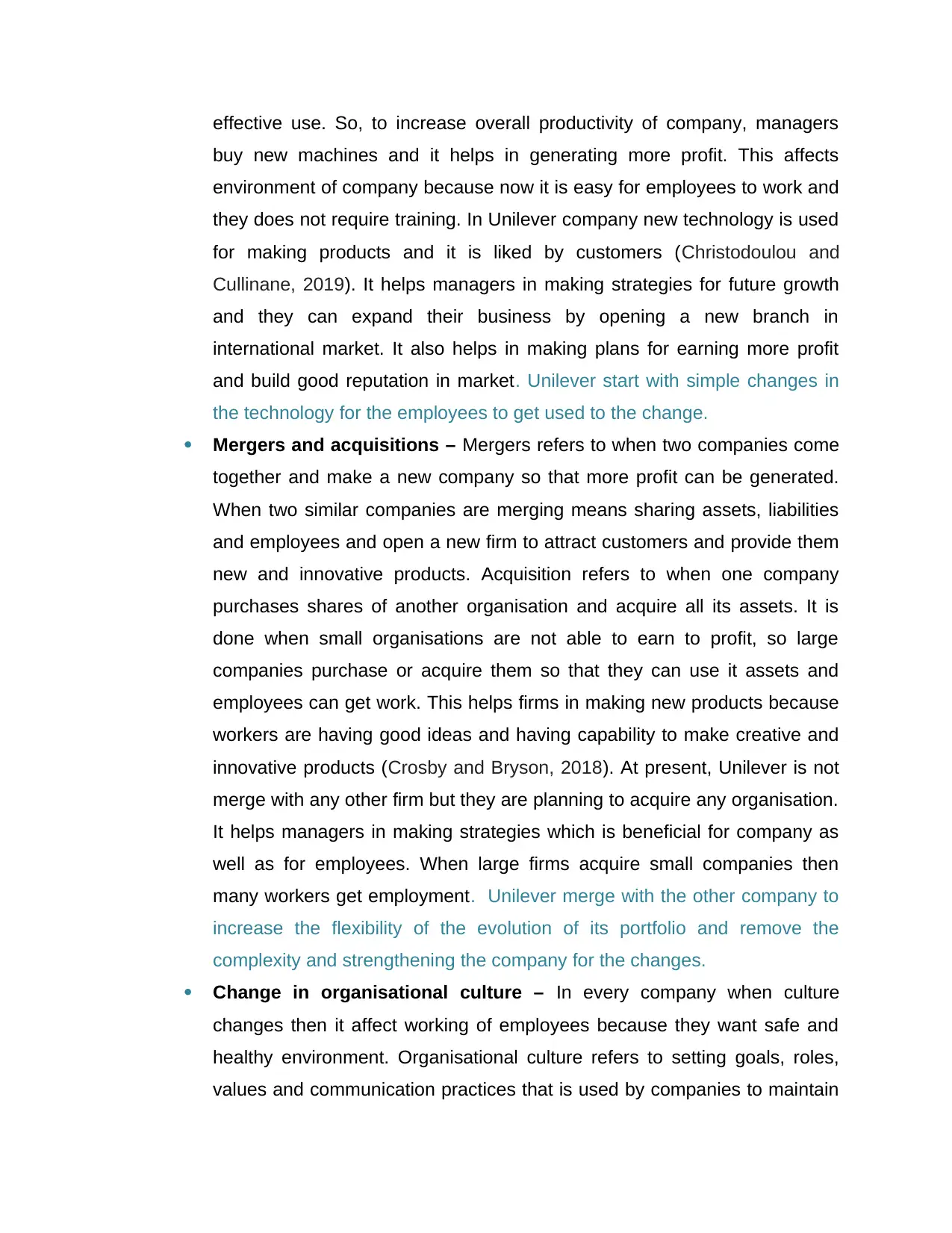
effective use. So, to increase overall productivity of company, managers
buy new machines and it helps in generating more profit. This affects
environment of company because now it is easy for employees to work and
they does not require training. In Unilever company new technology is used
for making products and it is liked by customers (Christodoulou and
Cullinane, 2019). It helps managers in making strategies for future growth
and they can expand their business by opening a new branch in
international market. It also helps in making plans for earning more profit
and build good reputation in market. Unilever start with simple changes in
the technology for the employees to get used to the change.
Mergers and acquisitions – Mergers refers to when two companies come
together and make a new company so that more profit can be generated.
When two similar companies are merging means sharing assets, liabilities
and employees and open a new firm to attract customers and provide them
new and innovative products. Acquisition refers to when one company
purchases shares of another organisation and acquire all its assets. It is
done when small organisations are not able to earn to profit, so large
companies purchase or acquire them so that they can use it assets and
employees can get work. This helps firms in making new products because
workers are having good ideas and having capability to make creative and
innovative products (Crosby and Bryson, 2018). At present, Unilever is not
merge with any other firm but they are planning to acquire any organisation.
It helps managers in making strategies which is beneficial for company as
well as for employees. When large firms acquire small companies then
many workers get employment. Unilever merge with the other company to
increase the flexibility of the evolution of its portfolio and remove the
complexity and strengthening the company for the changes.
Change in organisational culture – In every company when culture
changes then it affect working of employees because they want safe and
healthy environment. Organisational culture refers to setting goals, roles,
values and communication practices that is used by companies to maintain
buy new machines and it helps in generating more profit. This affects
environment of company because now it is easy for employees to work and
they does not require training. In Unilever company new technology is used
for making products and it is liked by customers (Christodoulou and
Cullinane, 2019). It helps managers in making strategies for future growth
and they can expand their business by opening a new branch in
international market. It also helps in making plans for earning more profit
and build good reputation in market. Unilever start with simple changes in
the technology for the employees to get used to the change.
Mergers and acquisitions – Mergers refers to when two companies come
together and make a new company so that more profit can be generated.
When two similar companies are merging means sharing assets, liabilities
and employees and open a new firm to attract customers and provide them
new and innovative products. Acquisition refers to when one company
purchases shares of another organisation and acquire all its assets. It is
done when small organisations are not able to earn to profit, so large
companies purchase or acquire them so that they can use it assets and
employees can get work. This helps firms in making new products because
workers are having good ideas and having capability to make creative and
innovative products (Crosby and Bryson, 2018). At present, Unilever is not
merge with any other firm but they are planning to acquire any organisation.
It helps managers in making strategies which is beneficial for company as
well as for employees. When large firms acquire small companies then
many workers get employment. Unilever merge with the other company to
increase the flexibility of the evolution of its portfolio and remove the
complexity and strengthening the company for the changes.
Change in organisational culture – In every company when culture
changes then it affect working of employees because they want safe and
healthy environment. Organisational culture refers to setting goals, roles,
values and communication practices that is used by companies to maintain
Paraphrase This Document
Need a fresh take? Get an instant paraphrase of this document with our AI Paraphraser
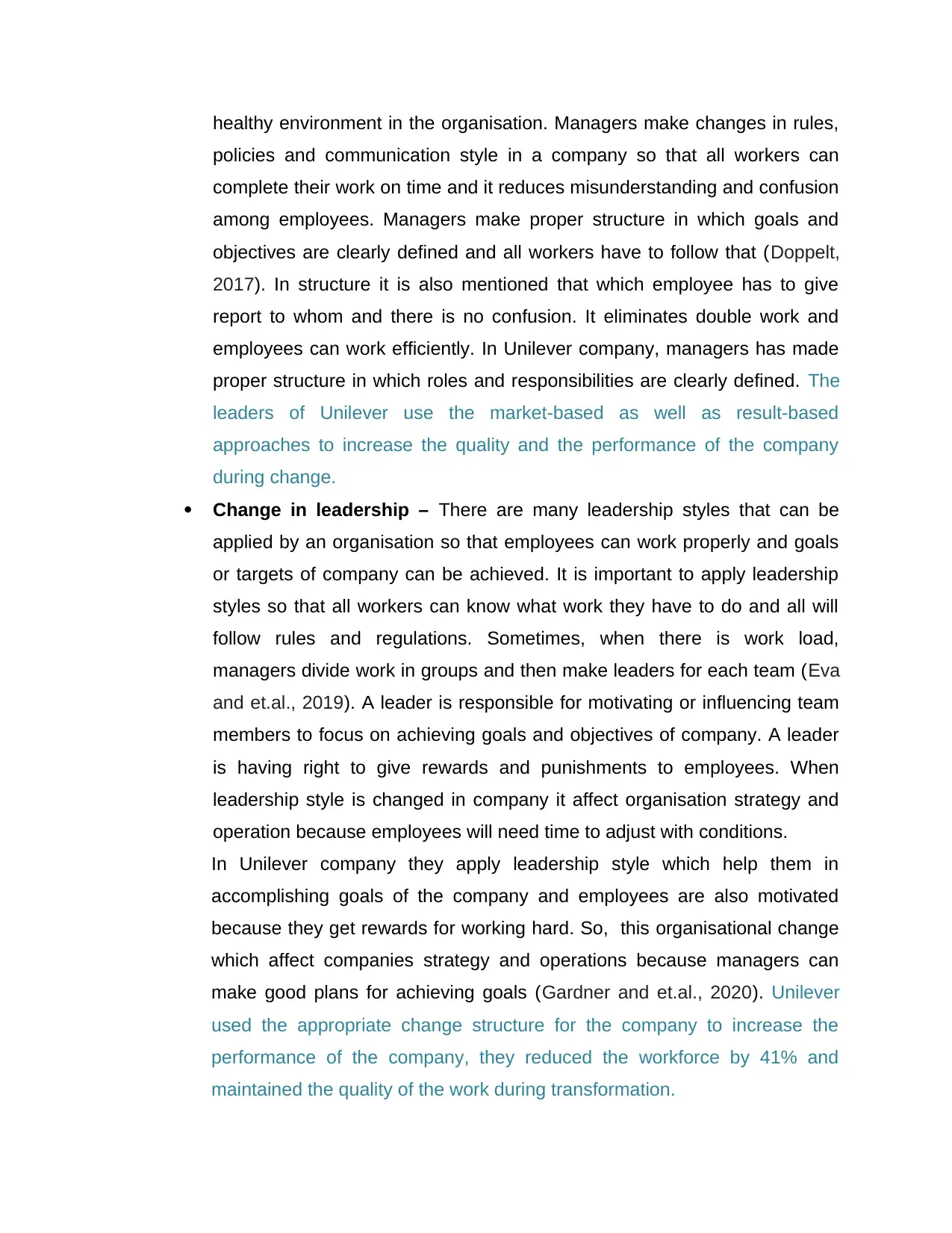
healthy environment in the organisation. Managers make changes in rules,
policies and communication style in a company so that all workers can
complete their work on time and it reduces misunderstanding and confusion
among employees. Managers make proper structure in which goals and
objectives are clearly defined and all workers have to follow that (Doppelt,
2017). In structure it is also mentioned that which employee has to give
report to whom and there is no confusion. It eliminates double work and
employees can work efficiently. In Unilever company, managers has made
proper structure in which roles and responsibilities are clearly defined. The
leaders of Unilever use the market-based as well as result-based
approaches to increase the quality and the performance of the company
during change.
Change in leadership – There are many leadership styles that can be
applied by an organisation so that employees can work properly and goals
or targets of company can be achieved. It is important to apply leadership
styles so that all workers can know what work they have to do and all will
follow rules and regulations. Sometimes, when there is work load,
managers divide work in groups and then make leaders for each team (Eva
and et.al., 2019). A leader is responsible for motivating or influencing team
members to focus on achieving goals and objectives of company. A leader
is having right to give rewards and punishments to employees. When
leadership style is changed in company it affect organisation strategy and
operation because employees will need time to adjust with conditions.
In Unilever company they apply leadership style which help them in
accomplishing goals of the company and employees are also motivated
because they get rewards for working hard. So, this organisational change
which affect companies strategy and operations because managers can
make good plans for achieving goals (Gardner and et.al., 2020). Unilever
used the appropriate change structure for the company to increase the
performance of the company, they reduced the workforce by 41% and
maintained the quality of the work during transformation.
policies and communication style in a company so that all workers can
complete their work on time and it reduces misunderstanding and confusion
among employees. Managers make proper structure in which goals and
objectives are clearly defined and all workers have to follow that (Doppelt,
2017). In structure it is also mentioned that which employee has to give
report to whom and there is no confusion. It eliminates double work and
employees can work efficiently. In Unilever company, managers has made
proper structure in which roles and responsibilities are clearly defined. The
leaders of Unilever use the market-based as well as result-based
approaches to increase the quality and the performance of the company
during change.
Change in leadership – There are many leadership styles that can be
applied by an organisation so that employees can work properly and goals
or targets of company can be achieved. It is important to apply leadership
styles so that all workers can know what work they have to do and all will
follow rules and regulations. Sometimes, when there is work load,
managers divide work in groups and then make leaders for each team (Eva
and et.al., 2019). A leader is responsible for motivating or influencing team
members to focus on achieving goals and objectives of company. A leader
is having right to give rewards and punishments to employees. When
leadership style is changed in company it affect organisation strategy and
operation because employees will need time to adjust with conditions.
In Unilever company they apply leadership style which help them in
accomplishing goals of the company and employees are also motivated
because they get rewards for working hard. So, this organisational change
which affect companies strategy and operations because managers can
make good plans for achieving goals (Gardner and et.al., 2020). Unilever
used the appropriate change structure for the company to increase the
performance of the company, they reduced the workforce by 41% and
maintained the quality of the work during transformation.
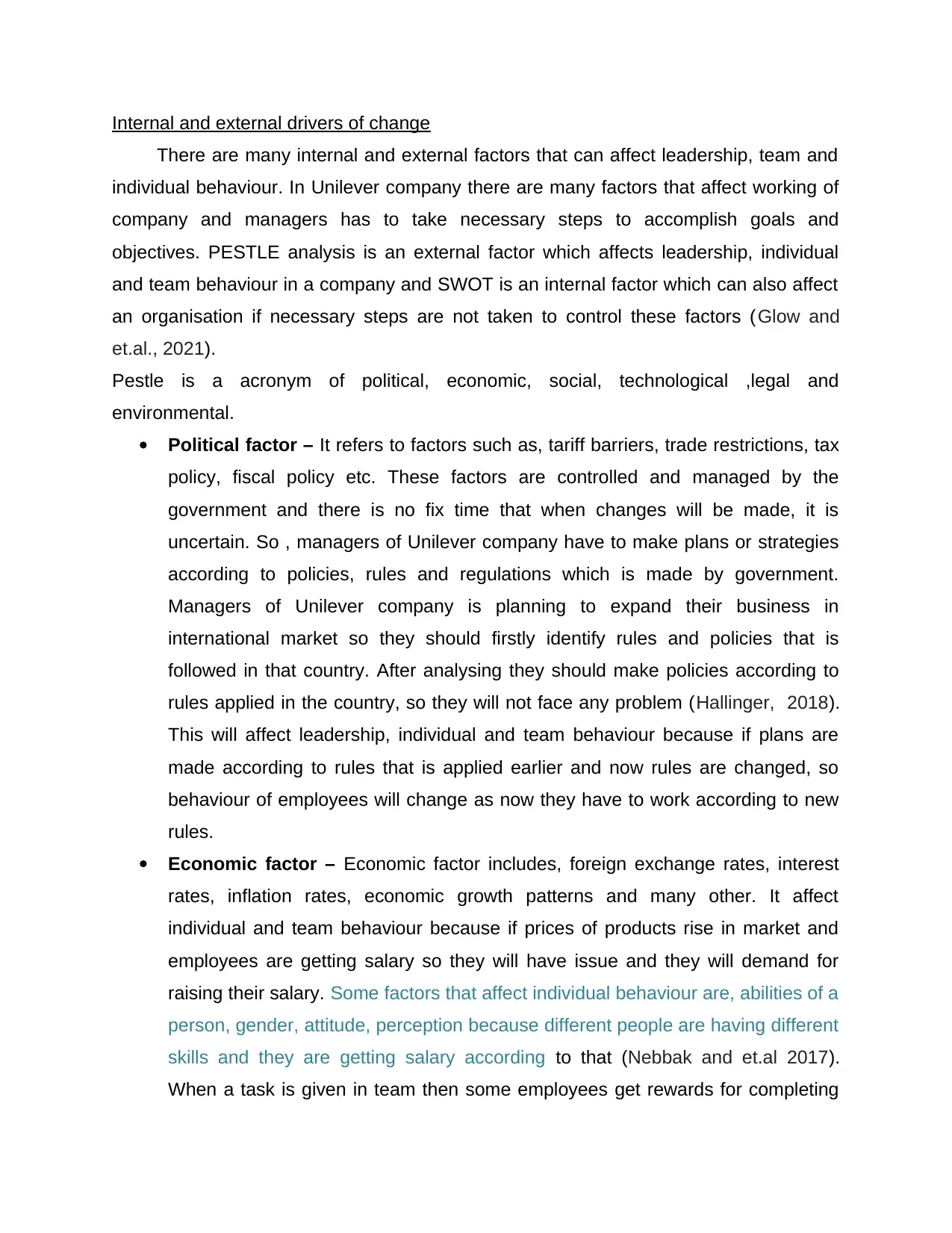
Internal and external drivers of change
There are many internal and external factors that can affect leadership, team and
individual behaviour. In Unilever company there are many factors that affect working of
company and managers has to take necessary steps to accomplish goals and
objectives. PESTLE analysis is an external factor which affects leadership, individual
and team behaviour in a company and SWOT is an internal factor which can also affect
an organisation if necessary steps are not taken to control these factors (Glow and
et.al., 2021).
Pestle is a acronym of political, economic, social, technological ,legal and
environmental.
Political factor – It refers to factors such as, tariff barriers, trade restrictions, tax
policy, fiscal policy etc. These factors are controlled and managed by the
government and there is no fix time that when changes will be made, it is
uncertain. So , managers of Unilever company have to make plans or strategies
according to policies, rules and regulations which is made by government.
Managers of Unilever company is planning to expand their business in
international market so they should firstly identify rules and policies that is
followed in that country. After analysing they should make policies according to
rules applied in the country, so they will not face any problem (Hallinger, 2018).
This will affect leadership, individual and team behaviour because if plans are
made according to rules that is applied earlier and now rules are changed, so
behaviour of employees will change as now they have to work according to new
rules.
Economic factor – Economic factor includes, foreign exchange rates, interest
rates, inflation rates, economic growth patterns and many other. It affect
individual and team behaviour because if prices of products rise in market and
employees are getting salary so they will have issue and they will demand for
raising their salary. Some factors that affect individual behaviour are, abilities of a
person, gender, attitude, perception because different people are having different
skills and they are getting salary according to that (Nebbak and et.al 2017).
When a task is given in team then some employees get rewards for completing
There are many internal and external factors that can affect leadership, team and
individual behaviour. In Unilever company there are many factors that affect working of
company and managers has to take necessary steps to accomplish goals and
objectives. PESTLE analysis is an external factor which affects leadership, individual
and team behaviour in a company and SWOT is an internal factor which can also affect
an organisation if necessary steps are not taken to control these factors (Glow and
et.al., 2021).
Pestle is a acronym of political, economic, social, technological ,legal and
environmental.
Political factor – It refers to factors such as, tariff barriers, trade restrictions, tax
policy, fiscal policy etc. These factors are controlled and managed by the
government and there is no fix time that when changes will be made, it is
uncertain. So , managers of Unilever company have to make plans or strategies
according to policies, rules and regulations which is made by government.
Managers of Unilever company is planning to expand their business in
international market so they should firstly identify rules and policies that is
followed in that country. After analysing they should make policies according to
rules applied in the country, so they will not face any problem (Hallinger, 2018).
This will affect leadership, individual and team behaviour because if plans are
made according to rules that is applied earlier and now rules are changed, so
behaviour of employees will change as now they have to work according to new
rules.
Economic factor – Economic factor includes, foreign exchange rates, interest
rates, inflation rates, economic growth patterns and many other. It affect
individual and team behaviour because if prices of products rise in market and
employees are getting salary so they will have issue and they will demand for
raising their salary. Some factors that affect individual behaviour are, abilities of a
person, gender, attitude, perception because different people are having different
skills and they are getting salary according to that (Nebbak and et.al 2017).
When a task is given in team then some employees get rewards for completing
⊘ This is a preview!⊘
Do you want full access?
Subscribe today to unlock all pages.

Trusted by 1+ million students worldwide
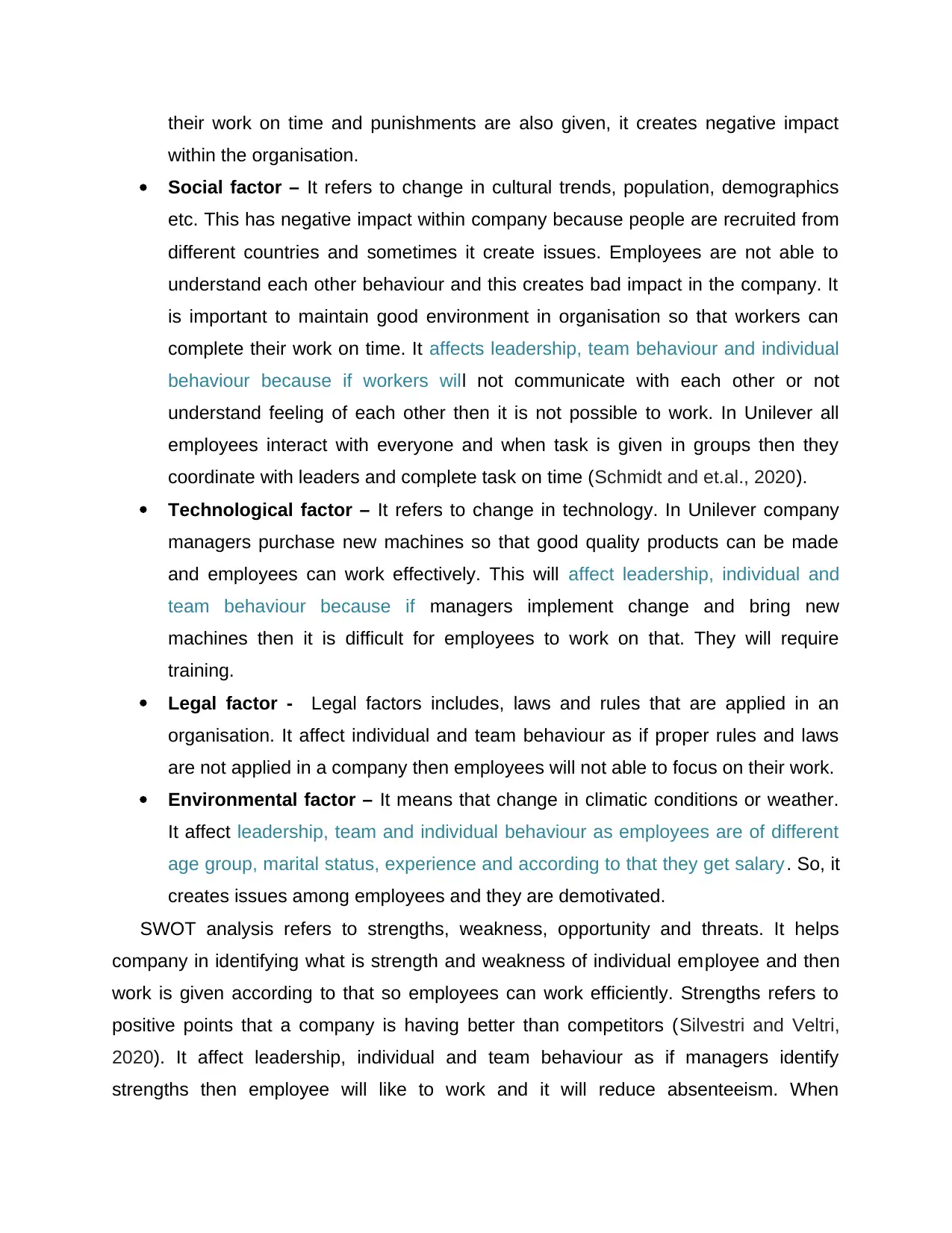
their work on time and punishments are also given, it creates negative impact
within the organisation.
Social factor – It refers to change in cultural trends, population, demographics
etc. This has negative impact within company because people are recruited from
different countries and sometimes it create issues. Employees are not able to
understand each other behaviour and this creates bad impact in the company. It
is important to maintain good environment in organisation so that workers can
complete their work on time. It affects leadership, team behaviour and individual
behaviour because if workers will not communicate with each other or not
understand feeling of each other then it is not possible to work. In Unilever all
employees interact with everyone and when task is given in groups then they
coordinate with leaders and complete task on time (Schmidt and et.al., 2020).
Technological factor – It refers to change in technology. In Unilever company
managers purchase new machines so that good quality products can be made
and employees can work effectively. This will affect leadership, individual and
team behaviour because if managers implement change and bring new
machines then it is difficult for employees to work on that. They will require
training.
Legal factor - Legal factors includes, laws and rules that are applied in an
organisation. It affect individual and team behaviour as if proper rules and laws
are not applied in a company then employees will not able to focus on their work.
Environmental factor – It means that change in climatic conditions or weather.
It affect leadership, team and individual behaviour as employees are of different
age group, marital status, experience and according to that they get salary. So, it
creates issues among employees and they are demotivated.
SWOT analysis refers to strengths, weakness, opportunity and threats. It helps
company in identifying what is strength and weakness of individual employee and then
work is given according to that so employees can work efficiently. Strengths refers to
positive points that a company is having better than competitors (Silvestri and Veltri,
2020). It affect leadership, individual and team behaviour as if managers identify
strengths then employee will like to work and it will reduce absenteeism. When
within the organisation.
Social factor – It refers to change in cultural trends, population, demographics
etc. This has negative impact within company because people are recruited from
different countries and sometimes it create issues. Employees are not able to
understand each other behaviour and this creates bad impact in the company. It
is important to maintain good environment in organisation so that workers can
complete their work on time. It affects leadership, team behaviour and individual
behaviour because if workers will not communicate with each other or not
understand feeling of each other then it is not possible to work. In Unilever all
employees interact with everyone and when task is given in groups then they
coordinate with leaders and complete task on time (Schmidt and et.al., 2020).
Technological factor – It refers to change in technology. In Unilever company
managers purchase new machines so that good quality products can be made
and employees can work effectively. This will affect leadership, individual and
team behaviour because if managers implement change and bring new
machines then it is difficult for employees to work on that. They will require
training.
Legal factor - Legal factors includes, laws and rules that are applied in an
organisation. It affect individual and team behaviour as if proper rules and laws
are not applied in a company then employees will not able to focus on their work.
Environmental factor – It means that change in climatic conditions or weather.
It affect leadership, team and individual behaviour as employees are of different
age group, marital status, experience and according to that they get salary. So, it
creates issues among employees and they are demotivated.
SWOT analysis refers to strengths, weakness, opportunity and threats. It helps
company in identifying what is strength and weakness of individual employee and then
work is given according to that so employees can work efficiently. Strengths refers to
positive points that a company is having better than competitors (Silvestri and Veltri,
2020). It affect leadership, individual and team behaviour as if managers identify
strengths then employee will like to work and it will reduce absenteeism. When
Paraphrase This Document
Need a fresh take? Get an instant paraphrase of this document with our AI Paraphraser
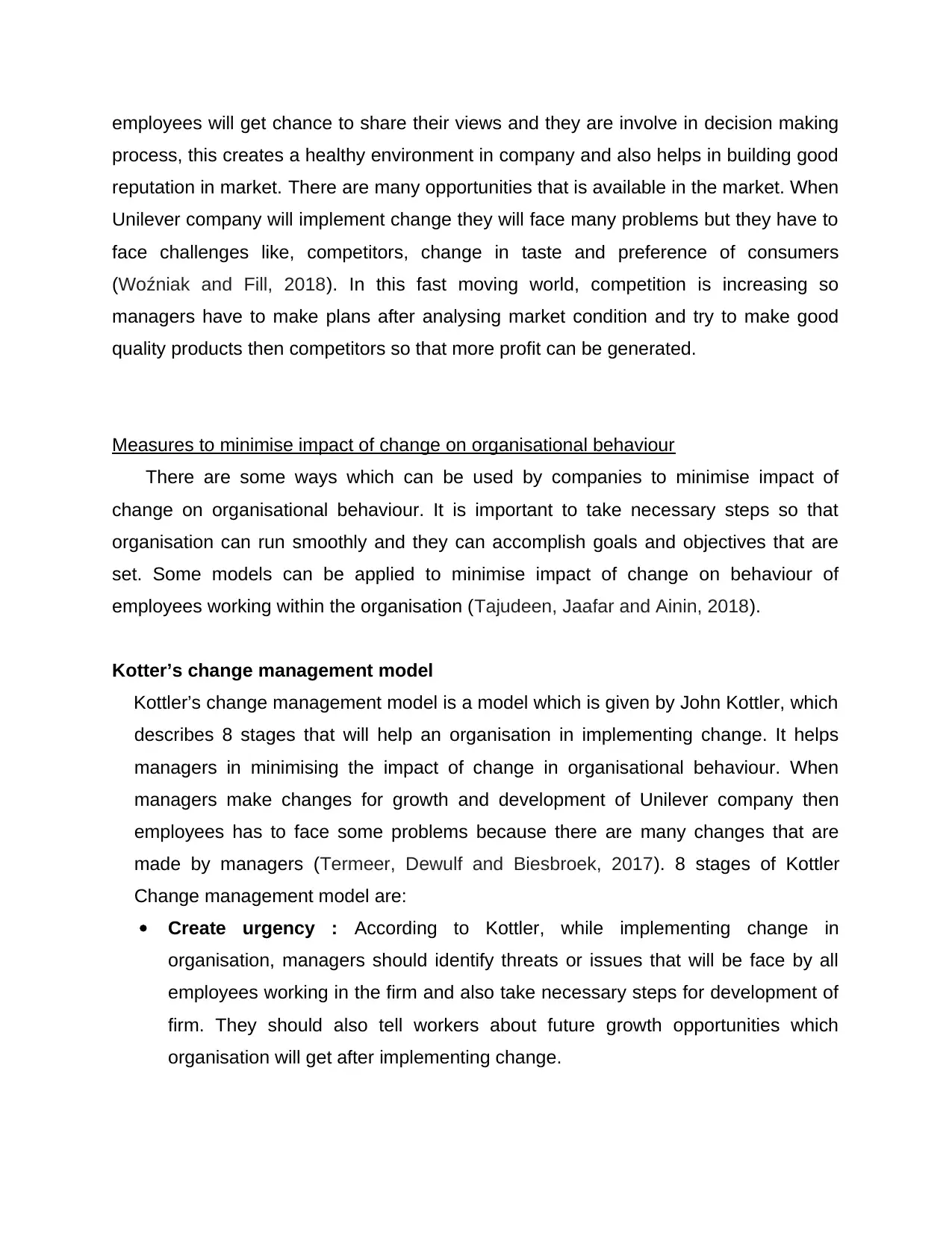
employees will get chance to share their views and they are involve in decision making
process, this creates a healthy environment in company and also helps in building good
reputation in market. There are many opportunities that is available in the market. When
Unilever company will implement change they will face many problems but they have to
face challenges like, competitors, change in taste and preference of consumers
(Woźniak and Fill, 2018). In this fast moving world, competition is increasing so
managers have to make plans after analysing market condition and try to make good
quality products then competitors so that more profit can be generated.
Measures to minimise impact of change on organisational behaviour
There are some ways which can be used by companies to minimise impact of
change on organisational behaviour. It is important to take necessary steps so that
organisation can run smoothly and they can accomplish goals and objectives that are
set. Some models can be applied to minimise impact of change on behaviour of
employees working within the organisation (Tajudeen, Jaafar and Ainin, 2018).
Kotter’s change management model
Kottler’s change management model is a model which is given by John Kottler, which
describes 8 stages that will help an organisation in implementing change. It helps
managers in minimising the impact of change in organisational behaviour. When
managers make changes for growth and development of Unilever company then
employees has to face some problems because there are many changes that are
made by managers (Termeer, Dewulf and Biesbroek, 2017). 8 stages of Kottler
Change management model are:
Create urgency : According to Kottler, while implementing change in
organisation, managers should identify threats or issues that will be face by all
employees working in the firm and also take necessary steps for development of
firm. They should also tell workers about future growth opportunities which
organisation will get after implementing change.
process, this creates a healthy environment in company and also helps in building good
reputation in market. There are many opportunities that is available in the market. When
Unilever company will implement change they will face many problems but they have to
face challenges like, competitors, change in taste and preference of consumers
(Woźniak and Fill, 2018). In this fast moving world, competition is increasing so
managers have to make plans after analysing market condition and try to make good
quality products then competitors so that more profit can be generated.
Measures to minimise impact of change on organisational behaviour
There are some ways which can be used by companies to minimise impact of
change on organisational behaviour. It is important to take necessary steps so that
organisation can run smoothly and they can accomplish goals and objectives that are
set. Some models can be applied to minimise impact of change on behaviour of
employees working within the organisation (Tajudeen, Jaafar and Ainin, 2018).
Kotter’s change management model
Kottler’s change management model is a model which is given by John Kottler, which
describes 8 stages that will help an organisation in implementing change. It helps
managers in minimising the impact of change in organisational behaviour. When
managers make changes for growth and development of Unilever company then
employees has to face some problems because there are many changes that are
made by managers (Termeer, Dewulf and Biesbroek, 2017). 8 stages of Kottler
Change management model are:
Create urgency : According to Kottler, while implementing change in
organisation, managers should identify threats or issues that will be face by all
employees working in the firm and also take necessary steps for development of
firm. They should also tell workers about future growth opportunities which
organisation will get after implementing change.
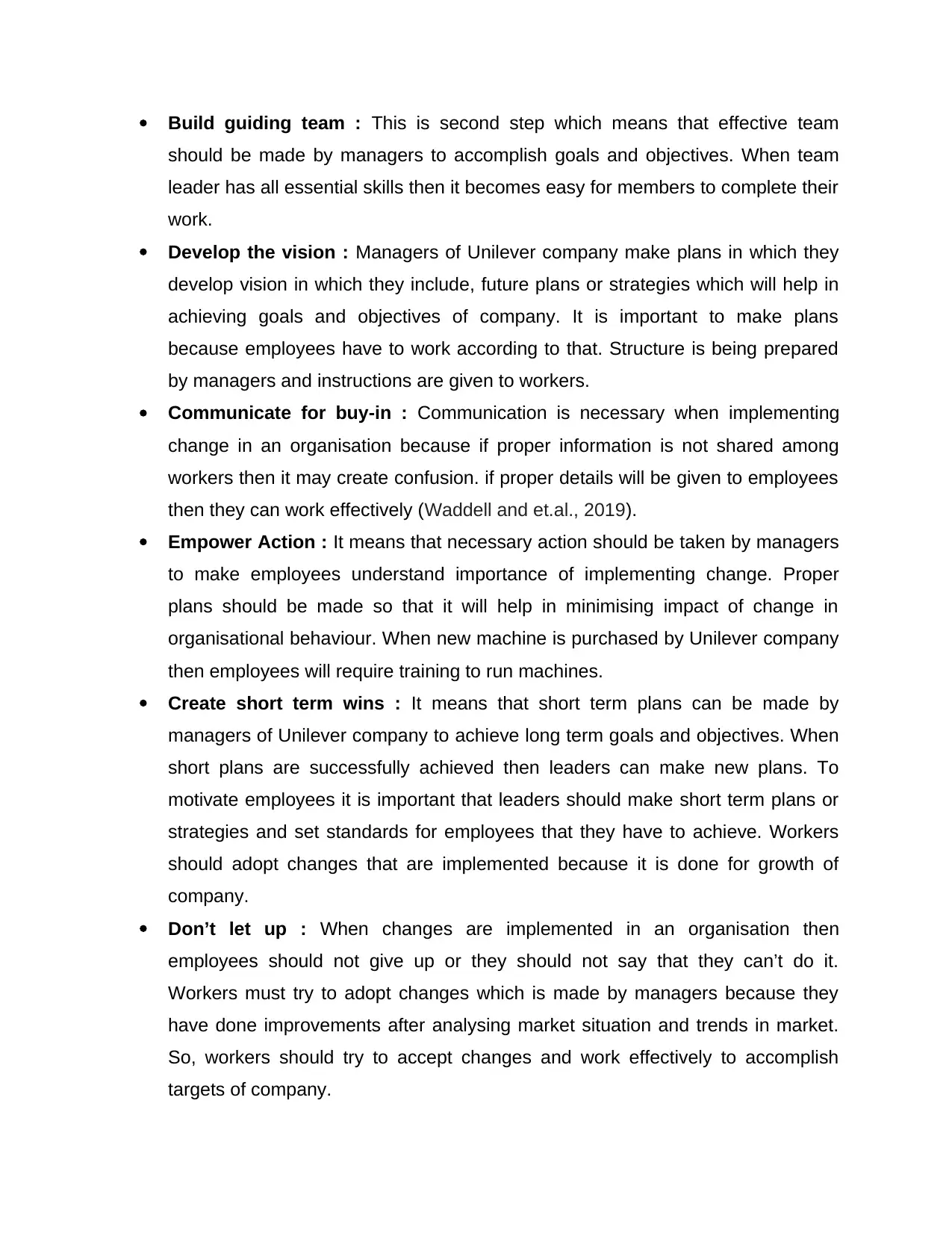
Build guiding team : This is second step which means that effective team
should be made by managers to accomplish goals and objectives. When team
leader has all essential skills then it becomes easy for members to complete their
work.
Develop the vision : Managers of Unilever company make plans in which they
develop vision in which they include, future plans or strategies which will help in
achieving goals and objectives of company. It is important to make plans
because employees have to work according to that. Structure is being prepared
by managers and instructions are given to workers.
Communicate for buy-in : Communication is necessary when implementing
change in an organisation because if proper information is not shared among
workers then it may create confusion. if proper details will be given to employees
then they can work effectively (Waddell and et.al., 2019).
Empower Action : It means that necessary action should be taken by managers
to make employees understand importance of implementing change. Proper
plans should be made so that it will help in minimising impact of change in
organisational behaviour. When new machine is purchased by Unilever company
then employees will require training to run machines.
Create short term wins : It means that short term plans can be made by
managers of Unilever company to achieve long term goals and objectives. When
short plans are successfully achieved then leaders can make new plans. To
motivate employees it is important that leaders should make short term plans or
strategies and set standards for employees that they have to achieve. Workers
should adopt changes that are implemented because it is done for growth of
company.
Don’t let up : When changes are implemented in an organisation then
employees should not give up or they should not say that they can’t do it.
Workers must try to adopt changes which is made by managers because they
have done improvements after analysing market situation and trends in market.
So, workers should try to accept changes and work effectively to accomplish
targets of company.
should be made by managers to accomplish goals and objectives. When team
leader has all essential skills then it becomes easy for members to complete their
work.
Develop the vision : Managers of Unilever company make plans in which they
develop vision in which they include, future plans or strategies which will help in
achieving goals and objectives of company. It is important to make plans
because employees have to work according to that. Structure is being prepared
by managers and instructions are given to workers.
Communicate for buy-in : Communication is necessary when implementing
change in an organisation because if proper information is not shared among
workers then it may create confusion. if proper details will be given to employees
then they can work effectively (Waddell and et.al., 2019).
Empower Action : It means that necessary action should be taken by managers
to make employees understand importance of implementing change. Proper
plans should be made so that it will help in minimising impact of change in
organisational behaviour. When new machine is purchased by Unilever company
then employees will require training to run machines.
Create short term wins : It means that short term plans can be made by
managers of Unilever company to achieve long term goals and objectives. When
short plans are successfully achieved then leaders can make new plans. To
motivate employees it is important that leaders should make short term plans or
strategies and set standards for employees that they have to achieve. Workers
should adopt changes that are implemented because it is done for growth of
company.
Don’t let up : When changes are implemented in an organisation then
employees should not give up or they should not say that they can’t do it.
Workers must try to adopt changes which is made by managers because they
have done improvements after analysing market situation and trends in market.
So, workers should try to accept changes and work effectively to accomplish
targets of company.
⊘ This is a preview!⊘
Do you want full access?
Subscribe today to unlock all pages.

Trusted by 1+ million students worldwide
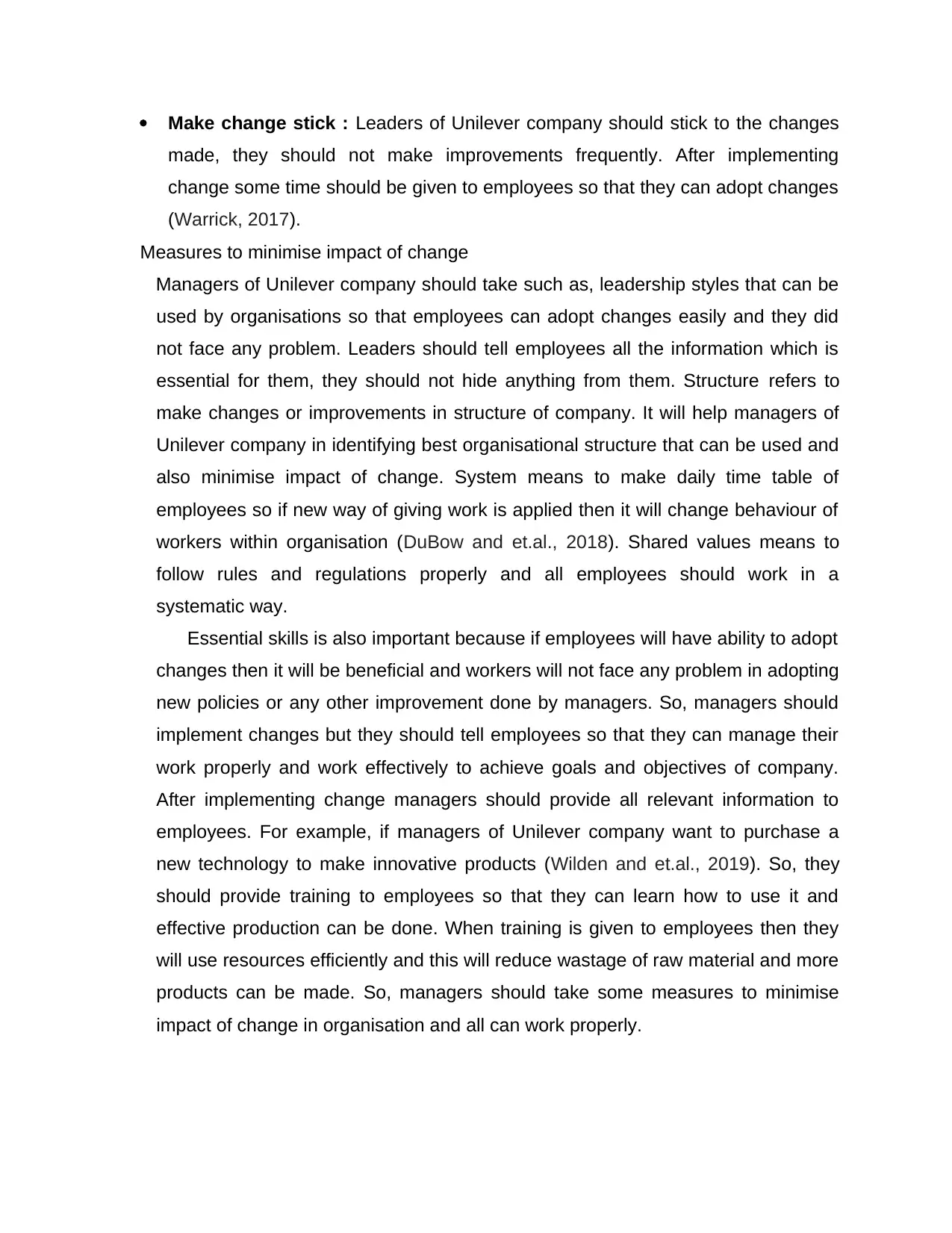
Make change stick : Leaders of Unilever company should stick to the changes
made, they should not make improvements frequently. After implementing
change some time should be given to employees so that they can adopt changes
(Warrick, 2017).
Measures to minimise impact of change
Managers of Unilever company should take such as, leadership styles that can be
used by organisations so that employees can adopt changes easily and they did
not face any problem. Leaders should tell employees all the information which is
essential for them, they should not hide anything from them. Structure refers to
make changes or improvements in structure of company. It will help managers of
Unilever company in identifying best organisational structure that can be used and
also minimise impact of change. System means to make daily time table of
employees so if new way of giving work is applied then it will change behaviour of
workers within organisation (DuBow and et.al., 2018). Shared values means to
follow rules and regulations properly and all employees should work in a
systematic way.
Essential skills is also important because if employees will have ability to adopt
changes then it will be beneficial and workers will not face any problem in adopting
new policies or any other improvement done by managers. So, managers should
implement changes but they should tell employees so that they can manage their
work properly and work effectively to achieve goals and objectives of company.
After implementing change managers should provide all relevant information to
employees. For example, if managers of Unilever company want to purchase a
new technology to make innovative products (Wilden and et.al., 2019). So, they
should provide training to employees so that they can learn how to use it and
effective production can be done. When training is given to employees then they
will use resources efficiently and this will reduce wastage of raw material and more
products can be made. So, managers should take some measures to minimise
impact of change in organisation and all can work properly.
made, they should not make improvements frequently. After implementing
change some time should be given to employees so that they can adopt changes
(Warrick, 2017).
Measures to minimise impact of change
Managers of Unilever company should take such as, leadership styles that can be
used by organisations so that employees can adopt changes easily and they did
not face any problem. Leaders should tell employees all the information which is
essential for them, they should not hide anything from them. Structure refers to
make changes or improvements in structure of company. It will help managers of
Unilever company in identifying best organisational structure that can be used and
also minimise impact of change. System means to make daily time table of
employees so if new way of giving work is applied then it will change behaviour of
workers within organisation (DuBow and et.al., 2018). Shared values means to
follow rules and regulations properly and all employees should work in a
systematic way.
Essential skills is also important because if employees will have ability to adopt
changes then it will be beneficial and workers will not face any problem in adopting
new policies or any other improvement done by managers. So, managers should
implement changes but they should tell employees so that they can manage their
work properly and work effectively to achieve goals and objectives of company.
After implementing change managers should provide all relevant information to
employees. For example, if managers of Unilever company want to purchase a
new technology to make innovative products (Wilden and et.al., 2019). So, they
should provide training to employees so that they can learn how to use it and
effective production can be done. When training is given to employees then they
will use resources efficiently and this will reduce wastage of raw material and more
products can be made. So, managers should take some measures to minimise
impact of change in organisation and all can work properly.
Paraphrase This Document
Need a fresh take? Get an instant paraphrase of this document with our AI Paraphraser
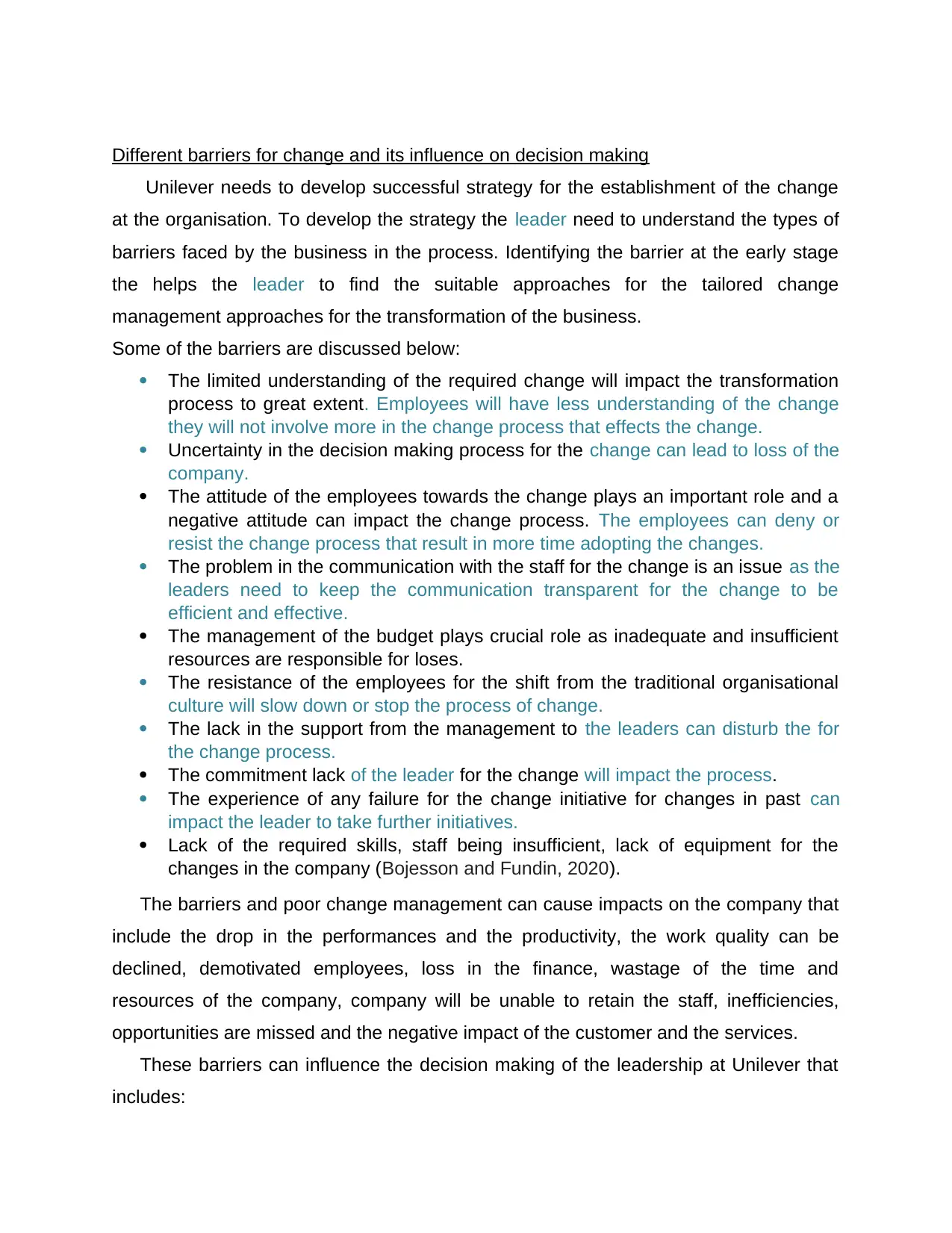
Different barriers for change and its influence on decision making
Unilever needs to develop successful strategy for the establishment of the change
at the organisation. To develop the strategy the leader need to understand the types of
barriers faced by the business in the process. Identifying the barrier at the early stage
the helps the leader to find the suitable approaches for the tailored change
management approaches for the transformation of the business.
Some of the barriers are discussed below:
The limited understanding of the required change will impact the transformation
process to great extent. Employees will have less understanding of the change
they will not involve more in the change process that effects the change.
Uncertainty in the decision making process for the change can lead to loss of the
company.
The attitude of the employees towards the change plays an important role and a
negative attitude can impact the change process. The employees can deny or
resist the change process that result in more time adopting the changes.
The problem in the communication with the staff for the change is an issue as the
leaders need to keep the communication transparent for the change to be
efficient and effective.
The management of the budget plays crucial role as inadequate and insufficient
resources are responsible for loses.
The resistance of the employees for the shift from the traditional organisational
culture will slow down or stop the process of change.
The lack in the support from the management to the leaders can disturb the for
the change process.
The commitment lack of the leader for the change will impact the process.
The experience of any failure for the change initiative for changes in past can
impact the leader to take further initiatives.
Lack of the required skills, staff being insufficient, lack of equipment for the
changes in the company (Bojesson and Fundin, 2020).
The barriers and poor change management can cause impacts on the company that
include the drop in the performances and the productivity, the work quality can be
declined, demotivated employees, loss in the finance, wastage of the time and
resources of the company, company will be unable to retain the staff, inefficiencies,
opportunities are missed and the negative impact of the customer and the services.
These barriers can influence the decision making of the leadership at Unilever that
includes:
Unilever needs to develop successful strategy for the establishment of the change
at the organisation. To develop the strategy the leader need to understand the types of
barriers faced by the business in the process. Identifying the barrier at the early stage
the helps the leader to find the suitable approaches for the tailored change
management approaches for the transformation of the business.
Some of the barriers are discussed below:
The limited understanding of the required change will impact the transformation
process to great extent. Employees will have less understanding of the change
they will not involve more in the change process that effects the change.
Uncertainty in the decision making process for the change can lead to loss of the
company.
The attitude of the employees towards the change plays an important role and a
negative attitude can impact the change process. The employees can deny or
resist the change process that result in more time adopting the changes.
The problem in the communication with the staff for the change is an issue as the
leaders need to keep the communication transparent for the change to be
efficient and effective.
The management of the budget plays crucial role as inadequate and insufficient
resources are responsible for loses.
The resistance of the employees for the shift from the traditional organisational
culture will slow down or stop the process of change.
The lack in the support from the management to the leaders can disturb the for
the change process.
The commitment lack of the leader for the change will impact the process.
The experience of any failure for the change initiative for changes in past can
impact the leader to take further initiatives.
Lack of the required skills, staff being insufficient, lack of equipment for the
changes in the company (Bojesson and Fundin, 2020).
The barriers and poor change management can cause impacts on the company that
include the drop in the performances and the productivity, the work quality can be
declined, demotivated employees, loss in the finance, wastage of the time and
resources of the company, company will be unable to retain the staff, inefficiencies,
opportunities are missed and the negative impact of the customer and the services.
These barriers can influence the decision making of the leadership at Unilever that
includes:
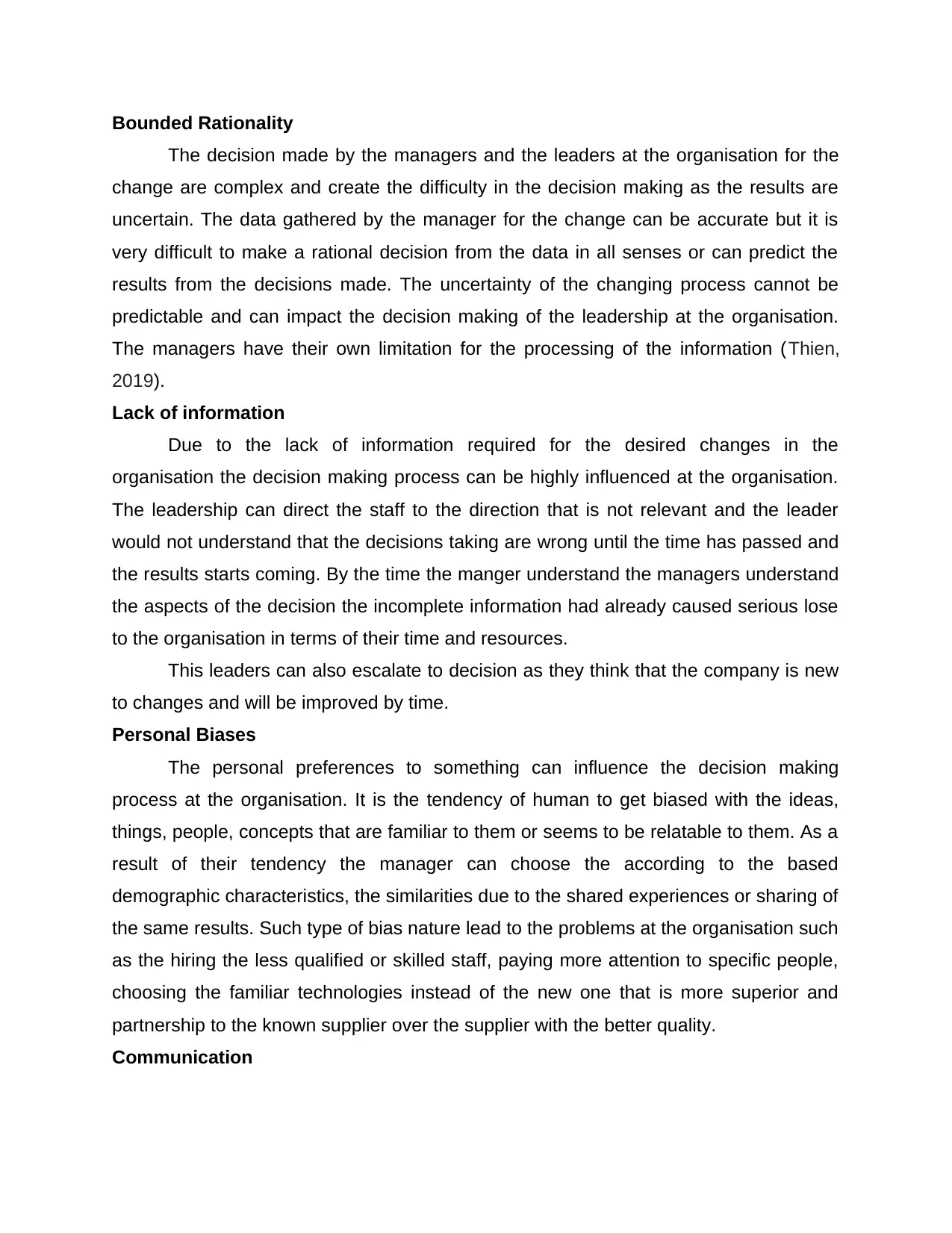
Bounded Rationality
The decision made by the managers and the leaders at the organisation for the
change are complex and create the difficulty in the decision making as the results are
uncertain. The data gathered by the manager for the change can be accurate but it is
very difficult to make a rational decision from the data in all senses or can predict the
results from the decisions made. The uncertainty of the changing process cannot be
predictable and can impact the decision making of the leadership at the organisation.
The managers have their own limitation for the processing of the information (Thien,
2019).
Lack of information
Due to the lack of information required for the desired changes in the
organisation the decision making process can be highly influenced at the organisation.
The leadership can direct the staff to the direction that is not relevant and the leader
would not understand that the decisions taking are wrong until the time has passed and
the results starts coming. By the time the manger understand the managers understand
the aspects of the decision the incomplete information had already caused serious lose
to the organisation in terms of their time and resources.
This leaders can also escalate to decision as they think that the company is new
to changes and will be improved by time.
Personal Biases
The personal preferences to something can influence the decision making
process at the organisation. It is the tendency of human to get biased with the ideas,
things, people, concepts that are familiar to them or seems to be relatable to them. As a
result of their tendency the manager can choose the according to the based
demographic characteristics, the similarities due to the shared experiences or sharing of
the same results. Such type of bias nature lead to the problems at the organisation such
as the hiring the less qualified or skilled staff, paying more attention to specific people,
choosing the familiar technologies instead of the new one that is more superior and
partnership to the known supplier over the supplier with the better quality.
Communication
The decision made by the managers and the leaders at the organisation for the
change are complex and create the difficulty in the decision making as the results are
uncertain. The data gathered by the manager for the change can be accurate but it is
very difficult to make a rational decision from the data in all senses or can predict the
results from the decisions made. The uncertainty of the changing process cannot be
predictable and can impact the decision making of the leadership at the organisation.
The managers have their own limitation for the processing of the information (Thien,
2019).
Lack of information
Due to the lack of information required for the desired changes in the
organisation the decision making process can be highly influenced at the organisation.
The leadership can direct the staff to the direction that is not relevant and the leader
would not understand that the decisions taking are wrong until the time has passed and
the results starts coming. By the time the manger understand the managers understand
the aspects of the decision the incomplete information had already caused serious lose
to the organisation in terms of their time and resources.
This leaders can also escalate to decision as they think that the company is new
to changes and will be improved by time.
Personal Biases
The personal preferences to something can influence the decision making
process at the organisation. It is the tendency of human to get biased with the ideas,
things, people, concepts that are familiar to them or seems to be relatable to them. As a
result of their tendency the manager can choose the according to the based
demographic characteristics, the similarities due to the shared experiences or sharing of
the same results. Such type of bias nature lead to the problems at the organisation such
as the hiring the less qualified or skilled staff, paying more attention to specific people,
choosing the familiar technologies instead of the new one that is more superior and
partnership to the known supplier over the supplier with the better quality.
Communication
⊘ This is a preview!⊘
Do you want full access?
Subscribe today to unlock all pages.

Trusted by 1+ million students worldwide
1 out of 18
Related Documents
Your All-in-One AI-Powered Toolkit for Academic Success.
+13062052269
info@desklib.com
Available 24*7 on WhatsApp / Email
![[object Object]](/_next/static/media/star-bottom.7253800d.svg)
Unlock your academic potential
Copyright © 2020–2026 A2Z Services. All Rights Reserved. Developed and managed by ZUCOL.




